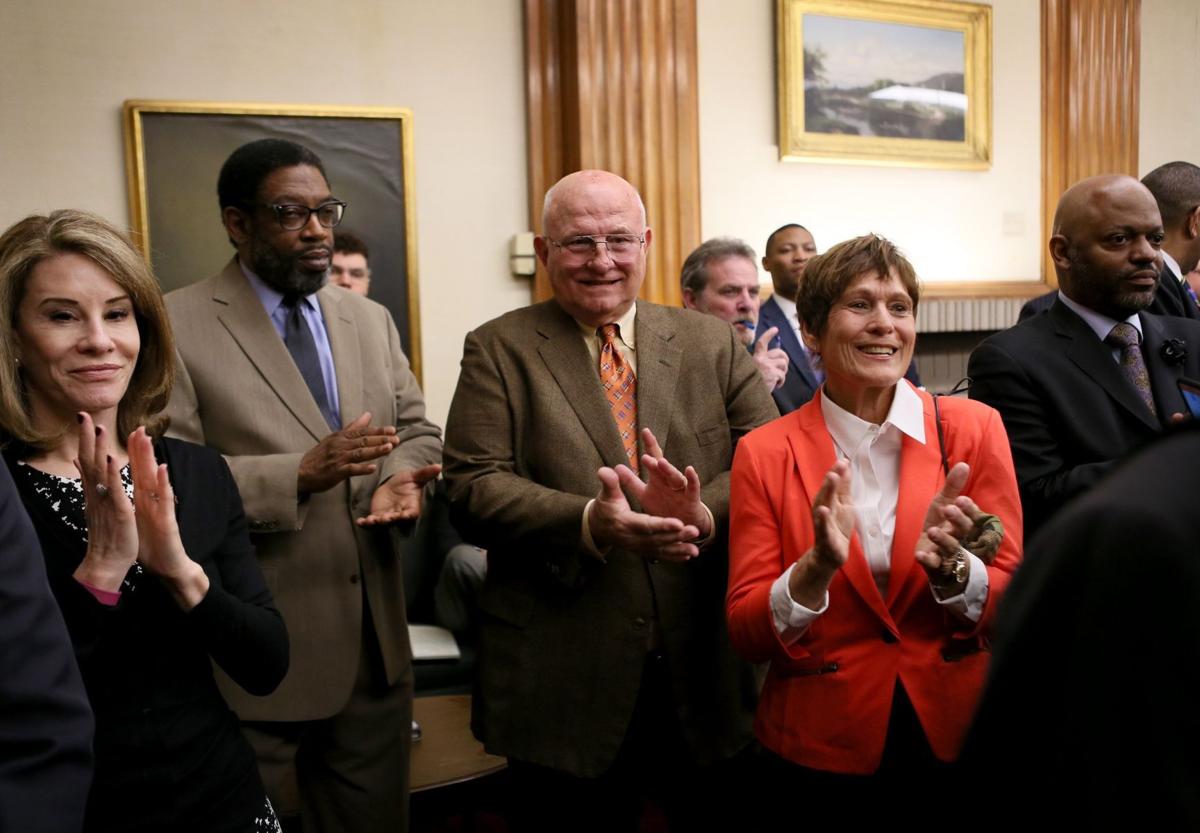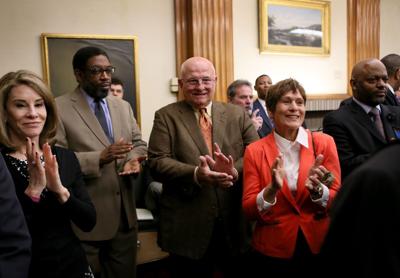ST. LOUIS ŌĆö The FBI in 2018 opened an investigation into NorthSide Regeneration and its real estate deals involving a now-lapsed Missouri tax credit program that funneled more than $40 million in credits to the developer and companies associated with it, documents obtained by the Post-Dispatch confirm.
FBI agents focused on allegations that NorthSide and other companies were involved in ŌĆ£fraud in the form of ŌĆśpaper-onlyŌĆÖ real estate transactions designed to manipulate MissouriŌĆÖs tax credit system for profit,ŌĆØ according to a March 2018 synopsis of the investigation.
The Post-Dispatch previously said that federal investigators appeared to be scrutinizing NorthSideŌĆÖs use of the tax credit program, reporting an FBI agent attended a 2018 trial involving the developerŌĆÖs real estate transactions and quoting a property owner who said agents asked him about a failed deal with NorthSide.
People are also reading…
But the documents, released under a federal Freedom of Information Act request and then obtained by the Post-Dispatch late last year, provide a clearer understanding of the investigation and confirm one of the targets was NorthSide Regeneration, led by developer Paul McKee and represented by attorneys at Stone, Leyton and Gershman.
The report includes details on multiple interviews conducted by FBI agents, including one with a representative from the real estate arm of the Archdiocese of ├█č┐┤½├Į that inked one of the final tax credit deals with NorthSide Regeneration.
Details on some of NorthSideŌĆÖs ŌĆ£paper-onlyŌĆØ transactions came out in a 2018 eminent domain trial for one of those properties, which was transferred to NorthSide to net the developer tax credits but was later deeded back to the original owner once the city needed to buy it to assemble a site for the National Geospatial-Intelligence Agency.
After those details emerged, ├█č┐┤½├Į officials terminated their 2009 development agreement with NorthSide Regeneration. But members of the ├█č┐┤½├Į Board of Aldermen have continued to work with the developer. In 2019, they approved up to $6.4 million in city incentives for a 19-bed health center set to open this spring on the site of the former Pruitt-Igoe housing complex.
The Post-Dispatch has documented other instances of transactions in which NorthSide put no money down and used seller-financing to acquire real estate ŌĆö essentially writing an IOU and transferring the ownership on paper ŌĆö in order to collect millions of dollars worth of state tax credits under the former Distressed Area Land Assemblage program.
One of those deals involved a company partially owned by Steve Stone, NorthSideŌĆÖs longtime attorney, who helped write the Distressed Area state tax credit legislation. Another involved fellow developers McKee had worked with in the past ŌĆö Larry Chapman and Bob Clark, who owned the downtown Bottle District before transferring it to NorthSide and triggering $9 million in state tax credits. Another involved a north ├█č┐┤½├Į factory that was later deeded back to the original owner after NorthSide collected $2.5 million in tax credits for the purported sale.
In all, at least a quarter of the $43 million in state tax credits provided to NorthSide under the program ŌĆö nearly all of the $47 million the state ultimately awarded before the program ended in 2013 ŌĆö were disbursed through seller-financed transactions.
Statute of limitations
The release of the documents indicates the investigation is closed, said attorney Neil Bruntrager, who has handled dozens of criminal cases in federal court. The Justice Department can refuse to admit the existence of an ongoing investigation, he said, so ŌĆ£if they are acknowledging the existence and providing reports, the reasonable conclusion is that the investigation is ended.ŌĆØ
The documents do not include any FBI interviews after August 2018. An FBI spokesman did not respond to a request for comment.
An assistant U.S. Attorney in the Eastern District of Missouri was briefed in 2018 on the case and agreed to bring wire fraud charges if the evidence warranted, according to the documents.
The statute of limitations for wire fraud is five years unless it involves a financial institution. Most of the transactions in the FBI report occurred in 2012 or earlier ŌĆö more than five years before the investigation was opened.
Missouri Attorney General Eric SchmittŌĆÖs office already settled a state tax credit lawsuit brought by his predecessor against NorthSide, dropping all future claims in exchange for a $324,000 payment from NorthSide.
Schmitt, when he was a Glendale state senator, carried bills to extend the Distressed Area tax credit program and create a new tax credit pushed by Stone and others to subsidize warehouses near ├█č┐┤½├Į Lambert International Airport, where McKee and Chapman were co-developers of NorthPark. Schmitt received some $150,000 in campaign contributions over the years from StoneŌĆÖs companies and NorthSide lender Bank of Washington. Schmitt has said he was not involved in the decision to settle the fraud lawsuit.
In response to questions about the federal investigation sent to McKee and Stone, attorney Paul Puricelli with Stone, Leyton and Gershman said they didnŌĆÖt know whether the federal investigation was still open and that they were ŌĆ£surprisedŌĆØ by the newspaperŌĆÖs ŌĆ£interest in these stale issues.ŌĆØ
Puricelli said the FBI did not subpoena or interview McKee, NorthSide or other affiliated companies.
The FBI report, however, does indicate at least one grand jury subpoena was issued in March 2018, though the identity of the person or company is redacted. It says a lawyer for the entity requested a meeting after the subpoena was issued, which an FBI agent and an assistant U.S. attorney attended.
Among the deals included in the report was NorthSideŌĆÖs acquisition of the Elkay manufacturing building on North 15th Street. NorthSide obtained nearly $2.5 million in tax credits from the state on a transaction valued at some $4.9 million ŌĆö well above the $75,000 the prior owners paid for the building in the ŌĆÖ80s. After obtaining the tax credits, NorthSide deeded the property back, prior owner Rick Pierce previously told the Post-Dispatch.
Another deal in the report appears to be the former Buster Brown building at Jefferson and Cass avenues, which the city had to acquire through eminent domain when its owner, Jim Osher, could not come to an agreement to sell. The city demolished the structure for the NGA project.
It was that 2018 eminent domain litigation that ultimately led to the discovery of the NorthSide real estate transactions under scrutiny. The city wanted to pay $810,000 for the building. Osher pointed to his 2011 transaction with NorthSide to argue for more. But that seller-financed transaction, for a paper value of $3.75 million without real money changing hands, was later unwound when the city wanted to buy the building for the NGA. The state later flagged the transaction and sought to claw back the tax credits.
Companies connected to Osher were also listed as targets in the investigation. One of the FBI interviews appears to be with Osher.
Reached by phone this week, Osher ŌĆö who in 2017 ran for ├█č┐┤½├Į mayor as a Republican ŌĆö confirmed he met with the FBI.
ŌĆ£I told them everything they wanted to know,ŌĆØ he said.
Osher had split the proceeds of the tax credits with NorthSide on the transaction.
ŌĆ£All the money I got from Paul McKee, all of it plus way, way, way more, was reinvested into the city,ŌĆØ Osher said. ŌĆ£All the moneyŌĆÖs been reinvested into the city and thatŌĆÖs exactly what the money was supposed to do, is to reinvest.ŌĆØ
Asked if he thought the investigation was ongoing, Osher said no.
ŌĆ£I think itŌĆÖs done because of the statute of limitations,ŌĆØ he said.
He said he heard that from an attorney but couldnŌĆÖt recall who the lawyer was working for.
There is no indication in the report that the FBI looked at the deal for the Bottle District ŌĆö land that has recently been back in the news.
Though itŌĆÖs owned by NorthSide Regeneration, Bob Clark of Clayco in September indicated he could donate the land to the city for a redesigned convention center. He made the comments during a last-minute lobbying campaign against the long-planned expansion of AmericaŌĆÖs Center.
The companies registered to Larry Chapman that transferred the Bottle District to NorthSide for no money down in a seller-financed deal ŌĆö triggering hundreds of thousands of dollars in tax credits for ŌĆ£brokerage feesŌĆØ and interest ŌĆö still appear to hold liens on the property.
Chapman said this week that it ŌĆ£wouldnŌĆÖt be a problemŌĆØ to transfer some Bottle District land if it was going to be part of a redesigned convention center.
ŌĆ£We always did all that in partnership with Paul,ŌĆØ Chapman said. ŌĆ£HeŌĆÖs our partner in NorthPark, and we were going to help make that develop no matter what, so we could always do that.ŌĆØ
Chapman said he was never contacted by federal investigators about the tax credit transactions.
Puricelli, the NorthSide lawyer, said NorthSide is under contract to sell the Bottle District ŌĆ£and intends to do so.ŌĆØ
Archdiocesan loan
Most of the FBI documents relate to NorthSide real estate deals the Post-Dispatch has already reported on. But there are some new details on one of the last transactions to trigger Distressed Area tax credits ŌĆö a deal Northside made with the Archdiocese.
The transaction for the former St. Patrick Catholic Church on Cole Street was completed just weeks before the August 2013 sunset of the Distressed Area program. The sale of the church building, reported to the state as worth $995,000, triggered $497,500 in state tax credits for NorthSide.
The representative from the Archdiocese real estate company told the FBI that NorthSide put $200,000 as a down payment on the land and the church was not offered ŌĆ£any portion of tax rebates.ŌĆØ
The July 30, 2013, note NorthSide made out to the Archdiocese, though, says that once NorthSide received the state tax credits, it would pay $200,000 to the ArchdioceseŌĆÖ property company, ├█č┐┤½├Į City Catholic Church Real Estate Corporation.
Much of the initial payment for the church was financed by one of ChapmanŌĆÖs Bottle Works companies, which lent NorthSide $110,000 for the down payment.
In the 2018 interview with the FBI, the church real estate representative said the company agreed to the terms of the deal because it had been difficult to sell the building. NorthSide was supposed to pay off the building in 2016. It asked for a two-year extension, to August 2018.
Puricelli, NorthSideŌĆÖs lawyer, said the Archdiocese has extended the note a few times and NorthSide is current on the loan. The developer owes just $311,000 from the original $885,000 note.
The church building is now leased to Grace Missionary Baptist Church, led by pastor Jonathan Davis.
A spokeswoman for the Archdiocese said it defers to buyers on whether to divulge details on transactions.
ŌĆ£To our knowledge,ŌĆØ she said, ŌĆ£no Church representatives have been subpoenaed in relation to this investigation.ŌĆØ
Originally posted at 11 a.m. Thursday, Jan. 13.

































